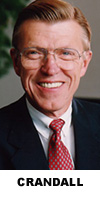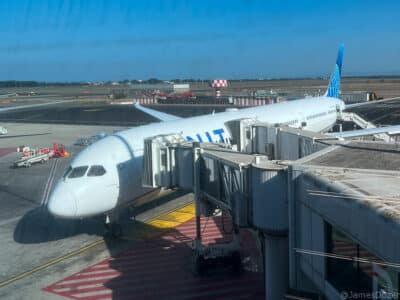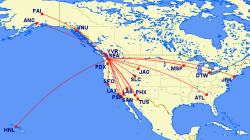Did you know…
- In 1990, Bill Clinton saved Deutsche Lufthansa Airlines from bankruptcy by using the benefits of the Airline Deregulation Act?
- Air Traffic Control systems in the U.S. are outdated by at least 25 years, despite the fact that air transport safety is at an all-time high.
- Over 54% of frequent flier miles “earned” by customers actually come from non-flying expenditures.
Former American Airlines CEO Robert Crandall worked for the carrier for 25 years, and is known for revolutionizing the travel industry (image courtesy of Google).
Sometimes the best leaders in a turbulent industry are the ones who are particularly bullish themselves in persona. Historical trends seem to indicate that, the ones who are known for revolutionary thinking are often the ones who will come out on top. In fact, more often than not, it seems to become a critical ingredient for leaders who work in industry landscapes which evolve at an alarming rate.
Take for example the era of airline deregulation: in 1980, when Robert Crandall was named President of American Airlines, the Carter administration had just implemented the new Airline Deregulation Act, which meant the elimination of government control over fares, routes, schedules and market entry of new airlines within the commercial aviation environment. Crandall, who eventually served as CEO of American from 1985 to 1998, knew at the time that an unregulated industry implied that airlines would try and out-compete each other by cutting prices, and thereby risk detonating their ability to produce profits.
During the years that followed, consumers found that the average fare per passenger mile dropped, and it seemed as though the “Golden Days” of flying were officially over as an airline ticket became much more commoditized. Lower fares were more readily available to offer the general public a chance to reap the benefits of high-speed air travel, without having to fork over $1,500 to get from coast to coast.
While great for consumers, however, the airlines suffered from a more “perfectly competitive” environment, and Crandall foresaw that such effects would take place within the market forces when deregulation became official. As time evolved, the results seemed consistent with his speculations, as over nine major carriers, including Eastern, Midway, Braniff, Pan Am, Continental, America West Airways, and TWA, along with 100 smaller airlines, either filed for bankruptcy or liquidated, due to heavy losses and labor union conflicts.
It took a bold and visionary thinker to realize far enough in advance that sincere innovation would be needed to determine other ways to make money, aside from just selling tickets.
So, under Crandall’s direction, American began to seek explore ways to put more passengers into as many seats as the planes could offer. Since an unfilled airline seat is a sunk cost, every extra passenger filling a perishable seat essentially guaranteed revenue for the airline.
With this in mind, American developed the core of what is now known as a “hub-and-spoke” system. This strategy involved funneling various flights from different destinations into a one hub city, which would allow an airline to be able to centralize its passenger flows into a single catchment area. As deregulation had now permitted airlines to have control over determining their own schedules, they could create “hub banks” that, during peak times, would re-direct connecting traffic onto other flights, and arguably guarantee that the planes would fly at higher load factors.
As time evolved, American nearly completely shifted away from point-to-point flying and instead developed their “cornerstone hub” strategy, by building up hub operations at key airports spread all over continental United States in Dallas/Ft. Worth, Chicago O’Hare, Miami, Los Angeles, and New York JFK international airports. Today, over 98% of all American Airlines’ flights either begin or terminate their journeys at one of these 5 hubs.
In addition, Crandall pioneered the inventions of other systems which have since become lifelines for the airlines. His new invention ideas is to innovate that will build brand loyalty included the frequent flier miles system, rewarding repeat travelers who gave their business to American with a free ticket, after they had accumulated a certain number of miles. Another item included the creation of American’s own computer reservations system, known as SABRE systems, which allowed it to achieve cost savings over rivals, and provide American flexibility in pricing its seats.
However, despite his successes as a leader, Crandall was also characterized by the media as a tough boss, who fought tooth and nail with unions. His hard exterior layer became difficult for American employees to contend with once the airline had achieved what seemed to be a sustainable level of success, so Crandall retired at age 62 in 1998 once it appeared that he and the unions no longer saw eye-to-eye.
Since then, the industry has gone through unprecedented twists and turns. It has been a struggle for the former CEO to watch his former employer suffer blow after blow as it struggles to keep abreast with the demanding nature of the industry, given all that he invested in its health before retirement. As such, people often look back to Crandall as a true pioneer who, in spite of his candid nature of leadership style, possessed ideologies that truly led the carrier on a course towards success, even as dramatic changes, such as deregulation, took place.
The Interview
Today’s blog post features an exclusive interview with Bob Crandall featured on Charlie Rose, an American television interview show on PBS, hosted by journalist Charlie Rose. Also in attendance is Peter Greenberg, a Travel Editor at CBS news, and together, Greenberg and Crandall provide their thoughts on the state of the industry and touch on some key talking points ranging from the aftermaths of deregulation to the need to develop High Speed Rail Services (HSR) in the United States.
As I mentioned earlier, Crandall is fairly outspoken about the current mess that the industry is in. However, as the ends continue to fray at its helm, it is at least clear that sugar-coating won’t help turn things around, which is why his frank opinions are so highly valued. In the interview, Crandall largely allocates the blame for the state of the industry on the lack of coherent and comprehensive public policy on aviation. Considering that 1 out of 7 US citizens are employed by jobs that that either directly or indirectly affects air travel (from aircraft manufacturing to travel/tourism to working for an airline itself) it is a pretty important sector of society that deserves proper administration and regulation.
Moreover, the interview, which lasts approximately 30 minutes, discusses some excellent topics that are either hotly contested, if not downright critical in demanding an immediate solution to help improve the travel experience domestically and abroad. As is, air travel has become a burden for almost every party involved: the small cities who have lost air service due to capacity reductions (and faced higher fares as a result of less competition), the ramp agent who is only told minutia detail from the operations team, but has to deliver the bad news about a delayed/cancelled flight without satisfactory explanation, all the way to the disgruntled passenger who feels lied to.
More significant, is that unless something is done in terms of altering the public policy situation, Crandall envisions that there may be even fewer carriers in existence 3 to 5 years down the road, and consolidation will only continue to plague consumers with higher fares, smaller planes, and fewer options.
Some highlights from the interview:
- 54% of miles earned today are on non flying (i.e. using a credit card). However, $17 trillion dollars worth spent on those credit cards are actually not being used to redeem eligible miles to use on award travel. That is because with passenger load factors at 82%, airlines are already flying fuller planes with no real incentive to bump revenue passengers to accomodate free-loaders, and have already “sold” those seats at a higher price by selling them as miles to the bank.
- Foreign ownership in the United States would be a “tragic error” of public policy. When Clinton allowed Lufthansa to codeshare with United Airlines, it gave Lufthansa access to the domestic US route system, which in turn emasculated the competitive nature of US carriers to be able to compete on international markets. As a consequence, it is debatable that a US carrier can out-compete a foreign carrier (alliance or codeshare partner withstanding) on a long-haul route at present times.
- Air Traffic safety is at an all-time high, knock on wood, but is that sustainable? Maintenance continues to be outsourced outside of the US in efforts to cut costs, so it is possible that lack of FAA oversight may present threats to the future safety of US carriers.
- ATC Systems is held back by lack of funding and political obstructionism, despite being 25 years out of date. The US is the only major country that has not created an independent ATC Company.
- JetBlue’s business model is truly one of a kind. It made an agreement with Airbus to purchase their planes, rather than lease them, but defer payments until three years after flying them. Without these significant capital costs, JetBlue turned profits instantly, and when their IPO went through the roof within 18 months, they could afford to buy them. They also treated Kennedy airport as a local airport, rather than an international gateway, knowing that there was a large flying population surrounding the airport that would happily fly out of it as long as they were offered a low price.
Click on the following link to access the interview:





